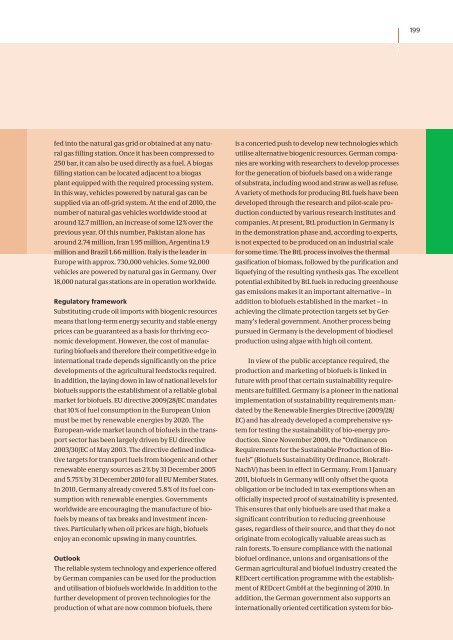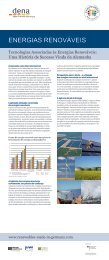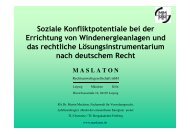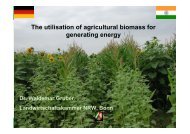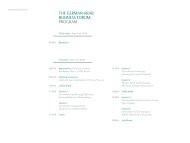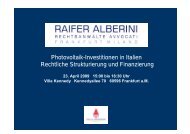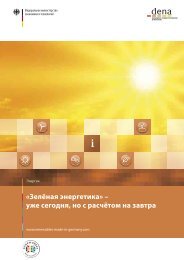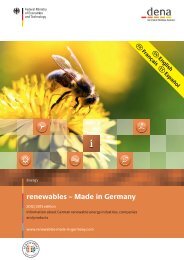renewables – Made in Germany
renewables – Made in Germany
renewables – Made in Germany
Create successful ePaper yourself
Turn your PDF publications into a flip-book with our unique Google optimized e-Paper software.
fed <strong>in</strong>to the natural gas grid or obta<strong>in</strong>ed at any natural<br />
gas fill<strong>in</strong>g station. Once it has been compressed to<br />
250 bar, it can also be used directly as a fuel. A biogas<br />
fill<strong>in</strong>g station can be located adjacent to a biogas<br />
plant equipped with the required process<strong>in</strong>g system.<br />
In this way, vehicles powered by natural gas can be<br />
supplied via an off-grid system. At the end of 2010, the<br />
number of natural gas vehicles worldwide stood at<br />
around 12.7 million, an <strong>in</strong>crease of some 12 % over the<br />
previous year. Of this number, Pakistan alone has<br />
around 2.74 million, Iran 1.95 million, Argent<strong>in</strong>a 1.9<br />
million and Brazil 1.66 million. Italy is the leader <strong>in</strong><br />
Europe with approx. 730,000 vehicles. Some 92,000<br />
vehicles are powered by natural gas <strong>in</strong> <strong>Germany</strong>. Over<br />
18,000 natural gas stations are <strong>in</strong> operation worldwide.<br />
Regulatory framework<br />
Substitut<strong>in</strong>g crude oil imports with biogenic resources<br />
means that long-term energy security and stable energy<br />
prices can be guaranteed as a basis for thriv<strong>in</strong>g economic<br />
development. However, the cost of manufactur<strong>in</strong>g<br />
biofuels and therefore their competitive edge <strong>in</strong><br />
<strong>in</strong>ternational trade depends significantly on the price<br />
developments of the agricultural feedstocks required.<br />
In addition, the lay<strong>in</strong>g down <strong>in</strong> law of national levels for<br />
biofuels supports the establishment of a reliable global<br />
market for biofuels. EU directive 2009/28/EC mandates<br />
that 10 % of fuel consumption <strong>in</strong> the European Union<br />
must be met by renewable energies by 2020. The<br />
European-wide market launch of biofuels <strong>in</strong> the transport<br />
sector has been largely driven by EU directive<br />
2003/30/EC of May 2003. The directive def<strong>in</strong>ed <strong>in</strong>dicative<br />
targets for transport fuels from biogenic and other<br />
renewable energy sources as 2 % by 31 December 2005<br />
and 5.75 % by 31 December 2010 for all EU Member States.<br />
In 2010, <strong>Germany</strong> already covered 5.8 % of its fuel consumption<br />
with renewable energies. Governments<br />
worldwide are encourag<strong>in</strong>g the manufacture of biofuels<br />
by means of tax breaks and <strong>in</strong>vestment <strong>in</strong>centives.<br />
Particularly when oil prices are high, biofuels<br />
enjoy an economic upsw<strong>in</strong>g <strong>in</strong> many countries.<br />
Outlook<br />
The reliable system technology and experience offered<br />
by German companies can be used for the production<br />
and utilisation of biofuels worldwide. In addition to the<br />
further development of proven technologies for the<br />
production of what are now common biofuels, there<br />
is a concerted push to develop new technologies which<br />
utilise alternative biogenic resources. German companies<br />
are work<strong>in</strong>g with researchers to develop processes<br />
for the generation of biofuels based on a wide range<br />
of substrata, <strong>in</strong>clud<strong>in</strong>g wood and straw as well as refuse.<br />
A variety of methods for produc<strong>in</strong>g BtL fuels have been<br />
developed through the research and pilot-scale production<br />
conducted by various research <strong>in</strong>stitutes and<br />
companies. At present, BtL production <strong>in</strong> <strong>Germany</strong> is<br />
<strong>in</strong> the demonstration phase and, accord<strong>in</strong>g to experts,<br />
is not expected to be produced on an <strong>in</strong>dustrial scale<br />
for some time. The BtL process <strong>in</strong>volves the thermal<br />
gasification of biomass, followed by the purification and<br />
liquefy<strong>in</strong>g of the result<strong>in</strong>g synthesis gas. The excellent<br />
potential exhibited by BtL fuels <strong>in</strong> reduc<strong>in</strong>g greenhouse<br />
gas emissions makes it an important alternative <strong>–</strong> <strong>in</strong><br />
addition to biofuels established <strong>in</strong> the market <strong>–</strong> <strong>in</strong><br />
achiev<strong>in</strong>g the climate protection targets set by <strong>Germany</strong>’s<br />
federal government. Another process be<strong>in</strong>g<br />
pursued <strong>in</strong> <strong>Germany</strong> is the development of biodiesel<br />
production us<strong>in</strong>g algae with high oil content.<br />
In view of the public acceptance required, the<br />
production and market<strong>in</strong>g of biofuels is l<strong>in</strong>ked <strong>in</strong><br />
future with proof that certa<strong>in</strong> susta<strong>in</strong>ability requirements<br />
are fulfilled. <strong>Germany</strong> is a pioneer <strong>in</strong> the national<br />
implementation of susta<strong>in</strong>ability requirements mandated<br />
by the Renewable Energies Directive (2009/28/<br />
EC) and has already developed a comprehensive system<br />
for test<strong>in</strong>g the susta<strong>in</strong>ability of bio-energy production.<br />
S<strong>in</strong>ce November 2009, the “Ord<strong>in</strong>ance on<br />
Requirements for the Susta<strong>in</strong>able Production of Biofuels”<br />
(Biofuels Susta<strong>in</strong>ability Ord<strong>in</strong>ance, Biokraft-<br />
NachV) has been <strong>in</strong> effect <strong>in</strong> <strong>Germany</strong>. From 1 January<br />
2011, bio fuels <strong>in</strong> <strong>Germany</strong> will only offset the quota<br />
obligation or be <strong>in</strong>cluded <strong>in</strong> tax exemptions when an<br />
officially <strong>in</strong>spected proof of susta<strong>in</strong>ability is presented.<br />
This ensures that only biofuels are used that make a<br />
signi ficant contribution to reduc<strong>in</strong>g greenhouse<br />
gases, regardless of their source, and that they do not<br />
ori g<strong>in</strong>ate from ecologically valuable areas such as<br />
ra<strong>in</strong> forests. To ensure compliance with the national<br />
biofuel ord<strong>in</strong>ance, unions and organisations of the<br />
German agricultural and biofuel <strong>in</strong>dustry created the<br />
REDcert certification programme with the establishment<br />
of REDcert GmbH at the beg<strong>in</strong>n<strong>in</strong>g of 2010. In<br />
addition, the German government also supports an<br />
<strong>in</strong>ternationally oriented certification system for bio-<br />
199


